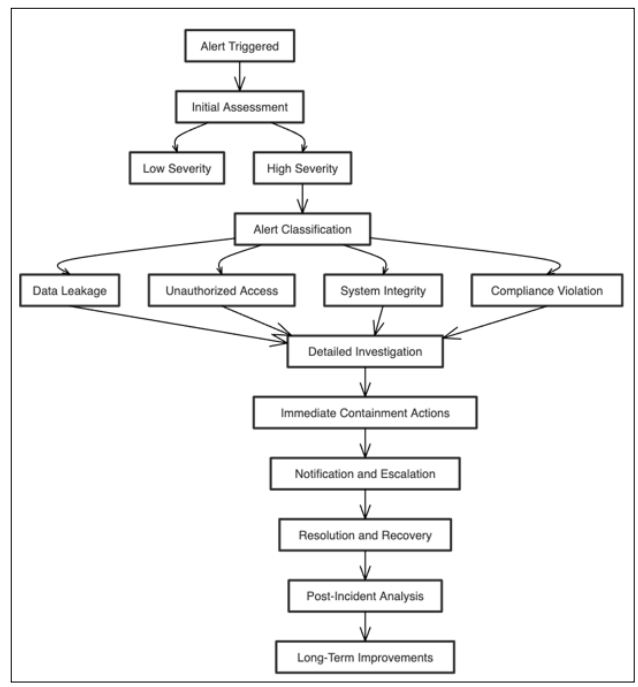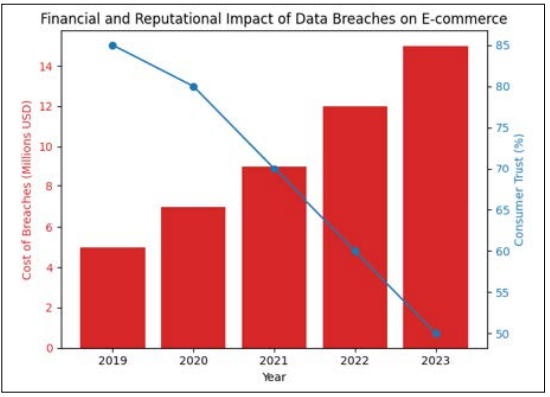Author(s): Alok Reddy Jakkula
The integration of artificial intelligence (AI) into e-commerce has brought remarkable advancements, significantly enhancing how businesses interact with customers and manage operations. However, the adoption of AI technologies also introduces substantial privacy and security risks, potentially exposing consumer data to new vulnerabilities. This qualitative research paper delves into the prevalent security threats and privacy issues stemming from the use of AI in e-commerce environments. By analyzing existing challenges, the study proposes strong, effective solutions aimed at improving data protection measures. It underscores the crucial need for developing resilient security frameworks and strategies that comply with regulatory standards, all to protect user data and strengthen consumer trust in AI-enhanced e-commerce platforms.
The rapid integration of AI technologies into the e-commerce sector has fundamentally transformed the industry. AI applications in e-commerce range from providing personalized shopping experiences and automated customer service to optimizing inventory management. These technologies enable e-commerce platforms to operate more efficiently and respond to customer needs with unprecedented speed and accuracy.
Despite the numerous benefits brought by AI, its integration into e-commerce platforms is not without significant risks, particularly concerning data privacy and security. AI systems process vast amounts of personal and sensitive data to function effectively, making them attractive targets for cyber-attacks. Furthermore, the complex nature of AI algorithms can sometimes result in unintended security vulnerabilities, potentially leading to data breaches that compromise consumer privacy.
This study seeks to address these critical issues by identifying and analyzing effective strategies to ensure data privacy and security within AI-enabled e-commerce platforms. The main goals are to:
Ensuring the security and privacy of consumer data is not merely a technical necessity but also a crucial factor in maintaining consumer trust and ensuring the sustainable growth of e-commerce platforms. By developing and implementing robust security frameworks that can adapt to the evolving nature of AI technologies and cyber threats, e-commerce businesses can protect their customers' data more effectively. Additionally, aligning these frameworks with regulatory compliance requirements is essential for businesses to avoid legal penalties and reputation damage. This study aims to contribute valuable insights and practical solutions to these challenges, helping to secure the future of AI in e-commerce.
Current Applications of AI in E-Commerce
Artificial Intelligence (AI) is increasingly being integrated into e-commerce platforms to enhance various aspects of business operations and customer service. Here are some key areas where AI is currently applied:
Despite their benefits, AI systems in e-commerce also introduce several vulnerabilities that can pose risks to both the business and its customers:

Figure 1: Decision Tree Diagram for Handling High Severity Security Alerts in AI-Enabled E-Commerce Platforms
To address these vulnerabilities, various data protection regulations have been implemented that directly impact how AI must be managed within e-commerce platforms:
General Data Protection Regulation (GDPR): Enacted by the European Union, the GDPR imposes strict guidelines on data privacy and security, including how data is collected, stored, processed, and shared. E-commerce platforms using AI must ensure they comply with GDPR by obtaining explicit consent from users for data collection, ensuring transparency about how AI uses the data, and implementing strong security measures to protect data.
California Consumer Privacy Act (CCPA): Similar to GDPR, the CCPA gives California residents more control over the personal information that businesses collect about them. It requires businesses, including AI-driven e-commerce platforms, to disclose data collection and sharing practices and grants consumers the right to view their personal data and request its deletion.
Analysis of Security Breaches

Figure 2: Bar Graph Representing Financial and Reputational Impacts of Data Breaches on E-Commerce Businesses . The detailed examination of security breaches in AI-enabled e-commerce platforms has revealed significant consequences.
E-commerce businesses are advised to implement these identified security strategies to not only enhance consumer trust but also ensure compliance with stringent regulatory standards. The successful adoption of these measures, however, faces several potential obstacles:
Moreover, the ethical responsibilities of managing consumer data are emphasized. E-commerce platforms must adhere to transparent data practices, ensuring that consumers understand how their data is being used and have control over their personal information.
The findings from this research underscore the critical importance of integrating robust security measures in AI-enabled e-commerce platforms. To protect consumer data effectively and build trust, it is recommended that businesses:
For future research, there is a need to explore the development of AI systems that are inherently designed with privacy and security considerations. Investigating how AI can be developed to naturally include these aspects will provide valuable insights and potentially pave the way for more secure AI applications in e-commerce [1-7].
